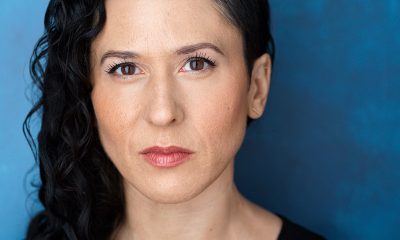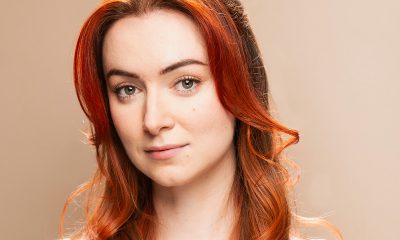Arts & Entertainment
Setting the stage
Gay theater designer says less is more in his field
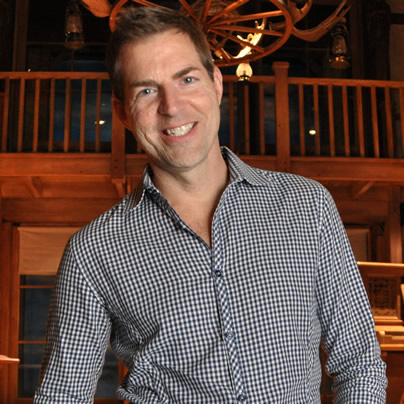
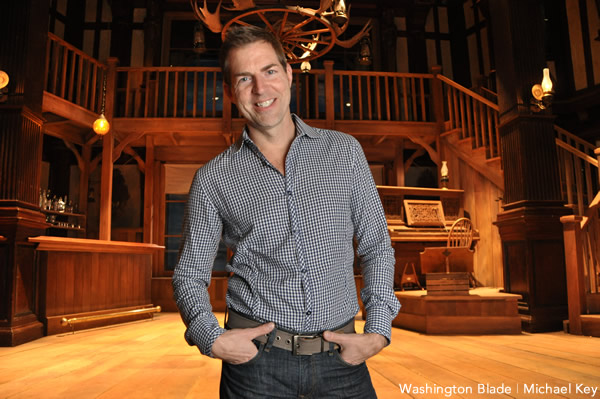
Local theater set designer Tony Cisek whose long career in Washington has garnered him four Helen Hayes Awards. (Blade photo by Michael Key)
A playwright sets the scene with words, but it’s up to the scenic designer to bring it to life visually.
As one of D.C.’s top set designers, Tony Cisek is a master at transporting audiences to places both foreign and familiar. In this year’s season alone, he’s taken us to an exotic Cypriot encampment, a steamy Florida cigar factory, an airport terminal and with his most recent work — “The Taming of the Shrew” currently running at the Folger Theatre — the Wild West.
Cisek (pronounced Chis-eck) explains that while sets can range anywhere from totally abstract to highly realistic, his typically lie someplace in between. For Ford’s Theatre fall production of “Parade” (the musical account of the 1913 murder of teenage factory work Mary Phagan in Atlanta in 1913 and the subsequent lynching of her accused murderer Leo Frank two years later), Cisek’s design was serviceable yet haunting: he imagined a newly industrialized red brick Atlanta with two towering columns, each in unchecked stages of decay, standing as fading remnants of a more glorious South.
“The ‘Parade’ set was the result of over 20 sketches,” he says. “My favorite way to design is to distill and distill, to edit down until you have just what you need. I’m not good at decorating or excessive dressing.”
“I’m not interested in a purely naturalistic representation of something that leaves nothing to the imagination,” says Cisek, who’s gay. “I feel the audiences come to theater because they’re interested in doing a little work, in having to lean forward and fill in, and they have the capacity to do this. I like using elements that evoke certain feelings, times and places by using textures and forms.”
Growing up in Queens, New York, Cisek was introduced to set design while working stage crew on high school plays, but it was as a pre-med major at Georgetown University that he began to get serious about it. “A friend dragged me to a Masque and Bauble production [Georgetown University’s student-run theater group],” he says. “And I was blown away that people my age could do something with such artistry. I got involved and learned a lot. If you had the aptitude and the inclination you could do almost anything.”
Soon, Sunday evening phone calls home focused on shows and sets rather than organic chemistry. By Cisek’s senior year it was obvious to both him and his parents that a future in medicine was out and a career as a professional set designer was taking shape. He went on to study scenic design at New York University’s Tisch School of the Arts. After receiving his master’s in 1994, he planned to stay on in Manhattan, but things worked out differently. Offers from the Washington theater scene came fast and frequently (and have continued uninterrupted), so he and his longtime partner, a scientist, make D.C. their home.
For the four-time Helen Hayes Award winner, inspiration comes in many ways.
“I like to say I never know when the muse will descend,” says Cisek, 47. “Sometimes it’s in the not-fully awake early hours when your brain is figuring things out without you or when you’re fiddling with the white model [a preliminary small scale model] or Skyping across country with a director. Often the indispensable lighting and costume designers will have a great suggestion.”
But Cisek’s favorite path to inspiration is brainstorming with the director in the theater. In the case of Folger Theatre’s “Othello” that ran earlier this season, he and director Robert Richmond did just that, spending several hours chasing down ideas and scribbling on napkins. In time, sketches and models were rendered and the technical director oversaw the execution of the design. Ultimately, the result was a dazzling set that morphed from a towering canopy bed elaborately crowned in carved wood to magistrate’s office to billowing ship sails to a fabulously appointed Bedouin-style tent.
Like many designers, Cisek enjoys working with simpatico directors. This season he collaborated with gay director José Carrasquillo three times: WSC Avant Bard’s “Happy Days” (memorably encasing actor Delia Taylor in a gigantic dress); GALA Theatre’s “Ana en el Tropico”; and Arthur Miller’s “After the Fall” at Theatre J, all well-received productions.
José Carrasquillo says, “Tony is fearless in expressing his feelings and opinions, but most importantly he enjoys making theater. It’s a gift to have a designer that despite the hard work that goes into doing a show, would not be anyplace else in the world, but right next to the director and the other team members inside a theater making a story three dimensional.”
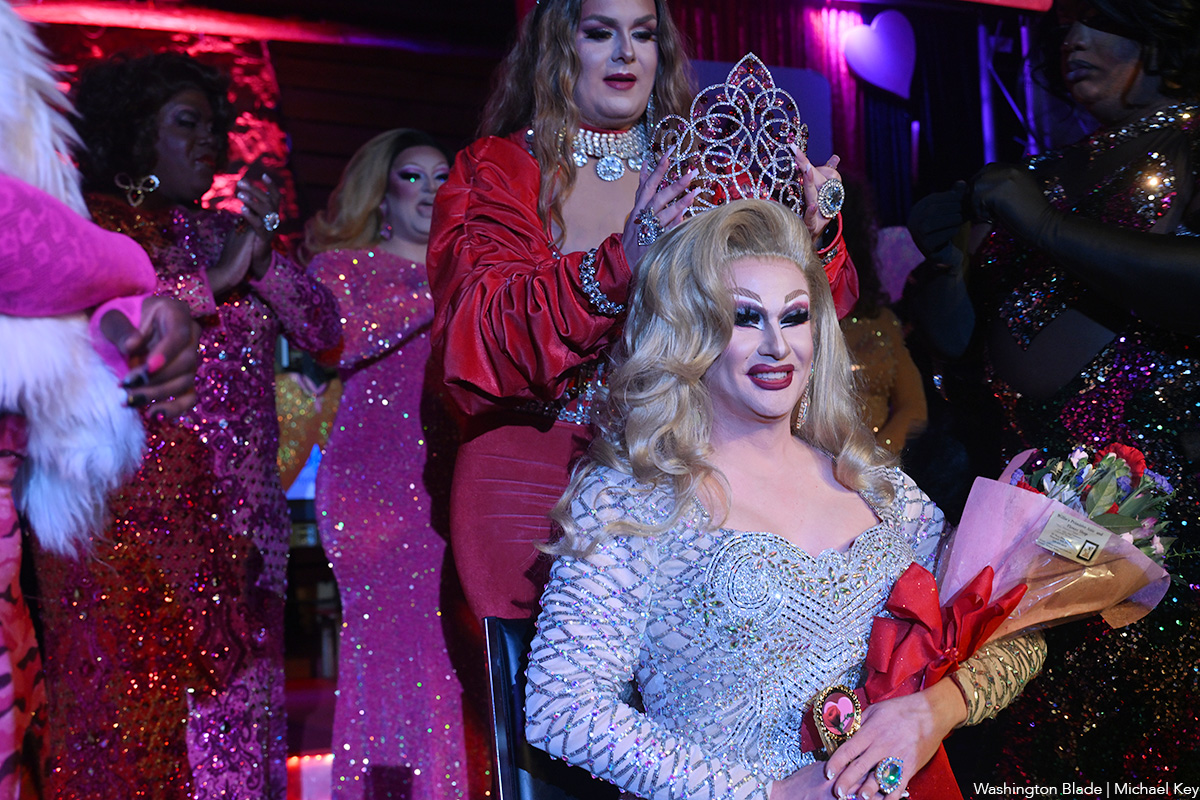
The 44th annual Queen of Hearts pageant was held at The Lodge in Boonsboro, Md. on Friday, Feb. 20. Six contestants vied for the title and Bev was crowned the winner.
(Washington Blade photos by Michael Key)
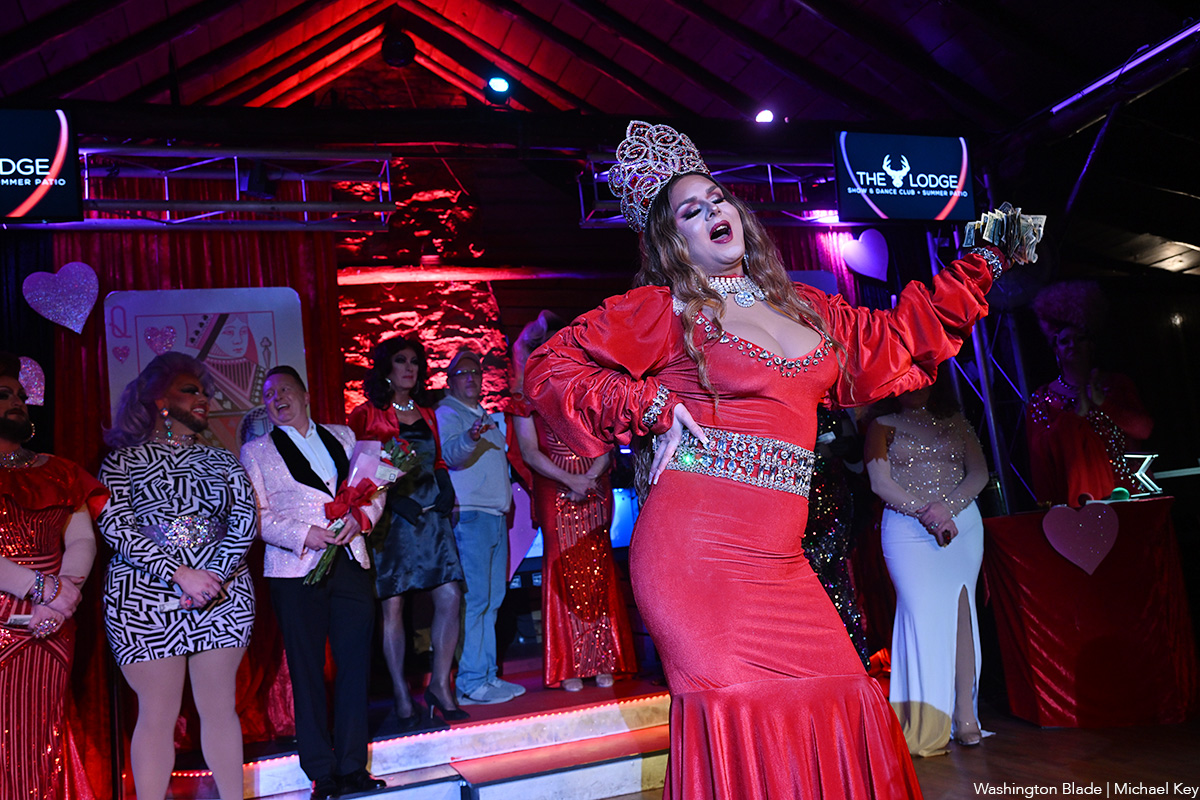
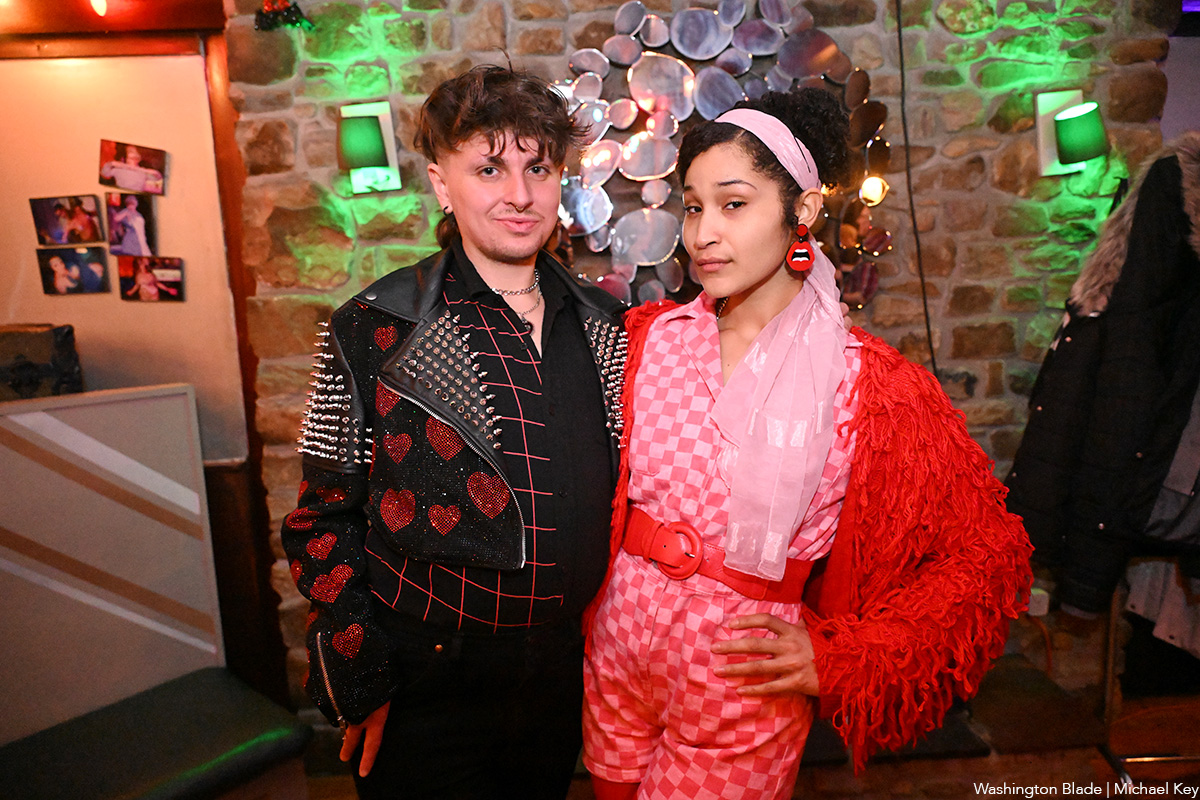
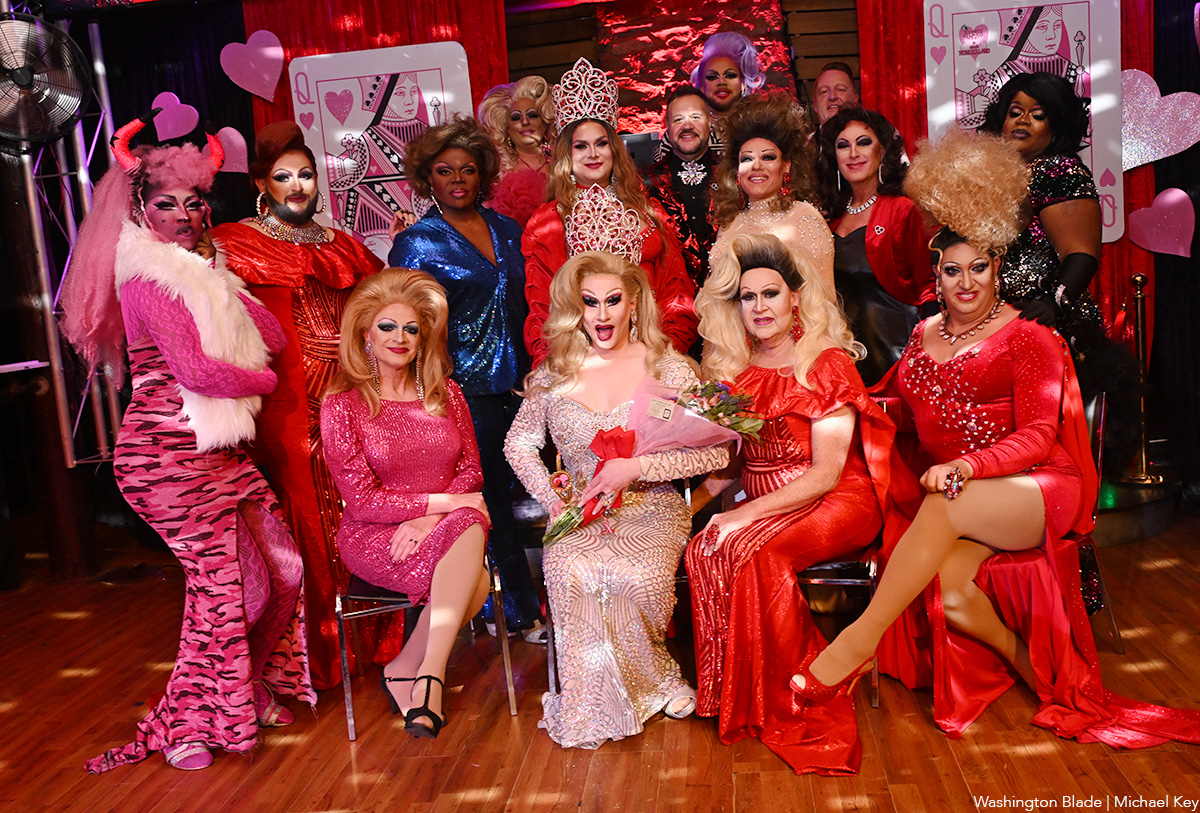
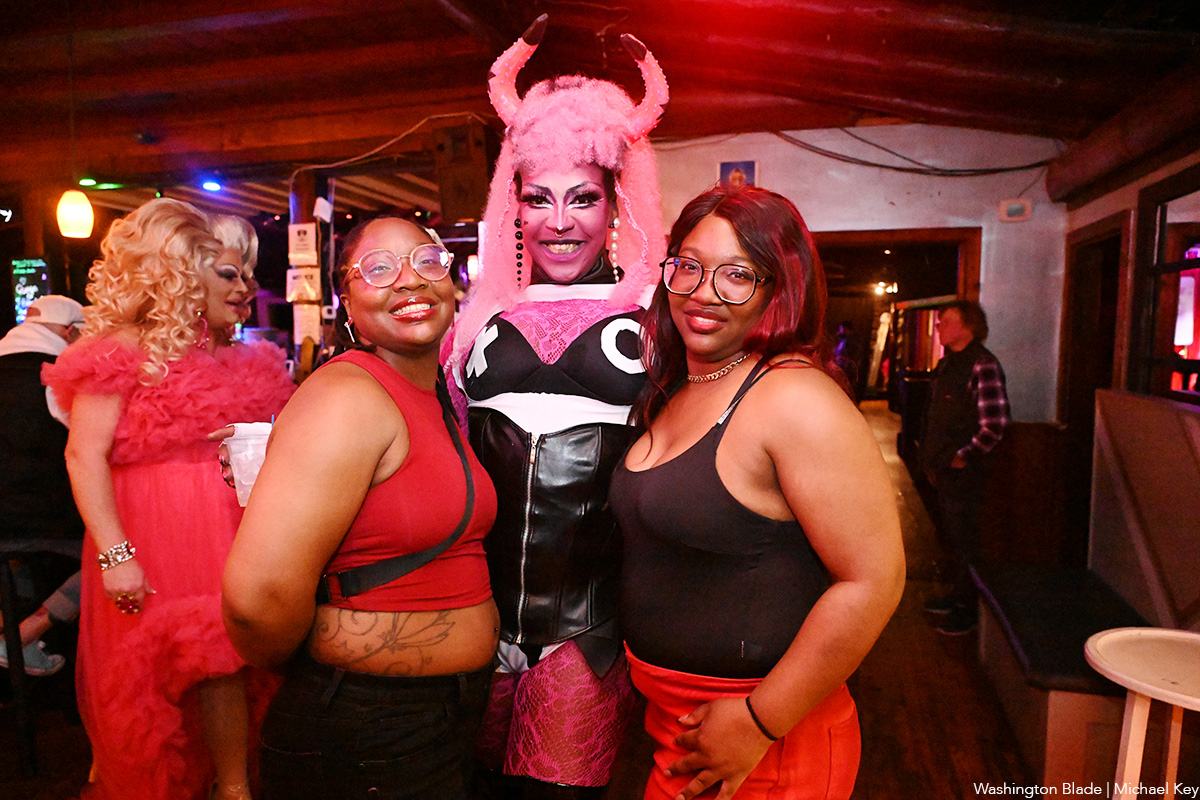
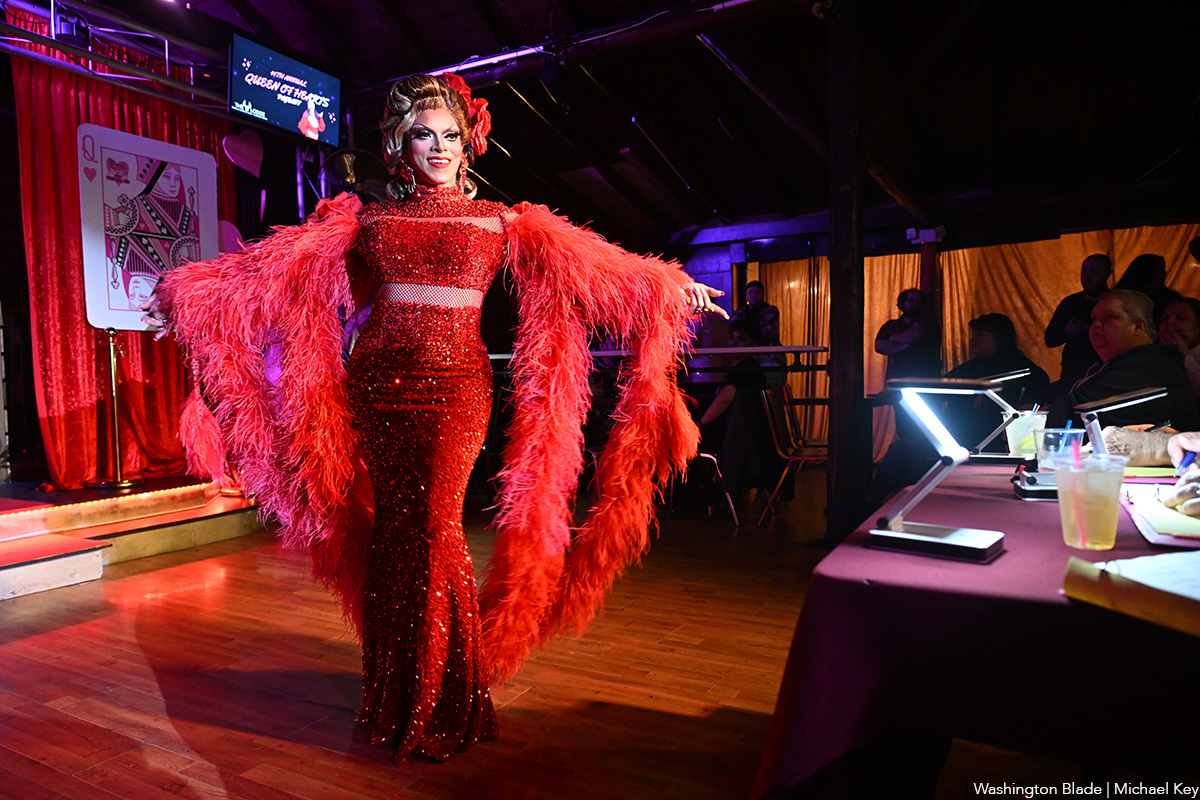
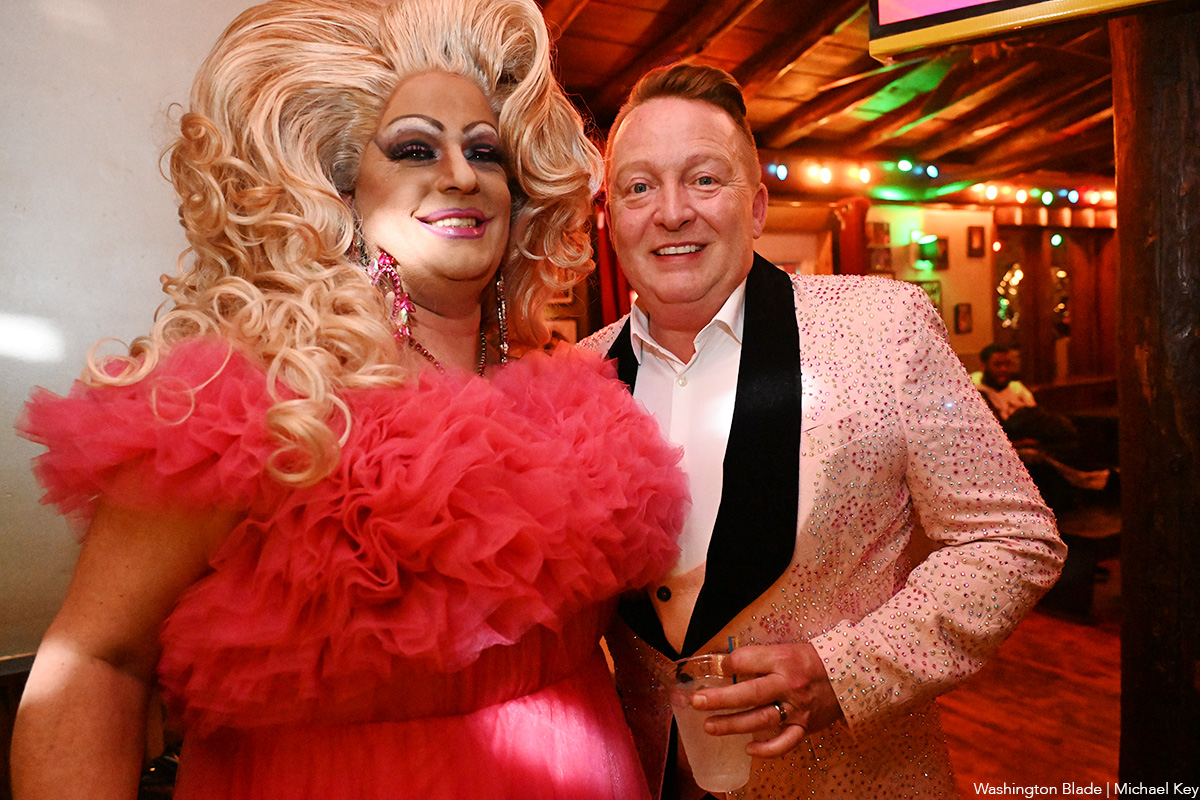
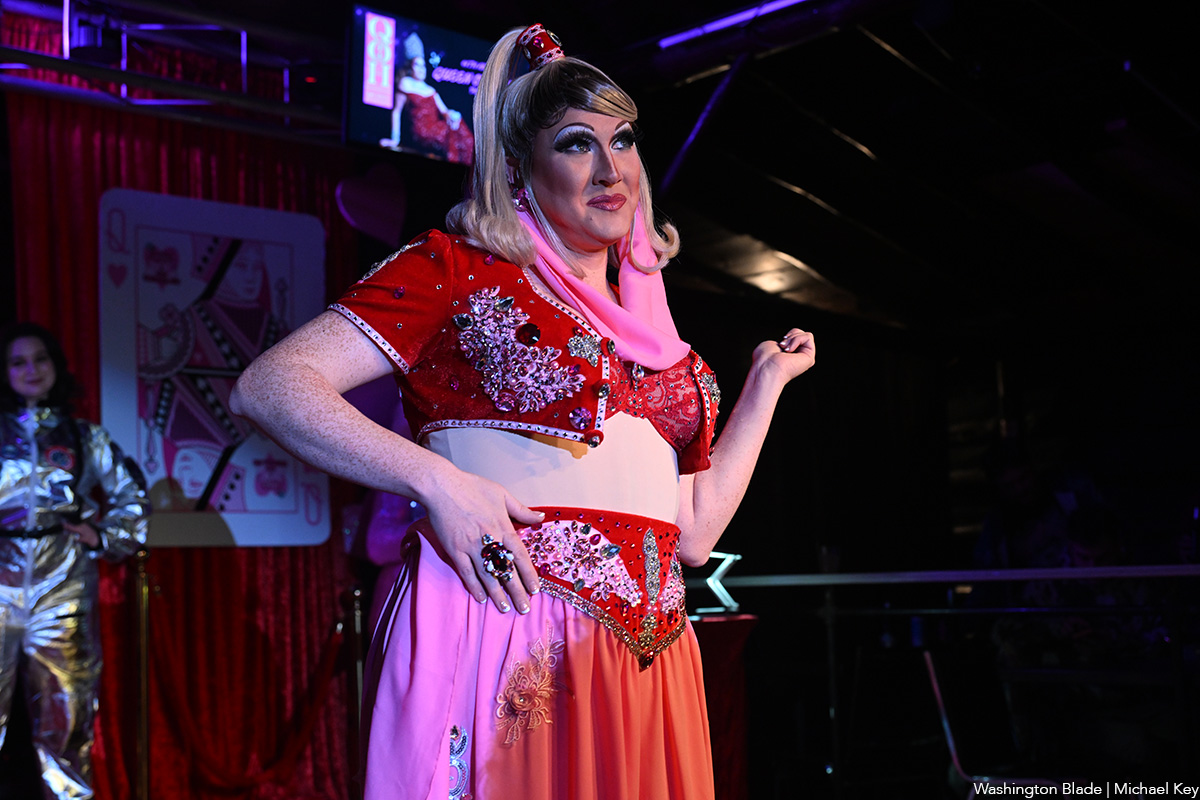
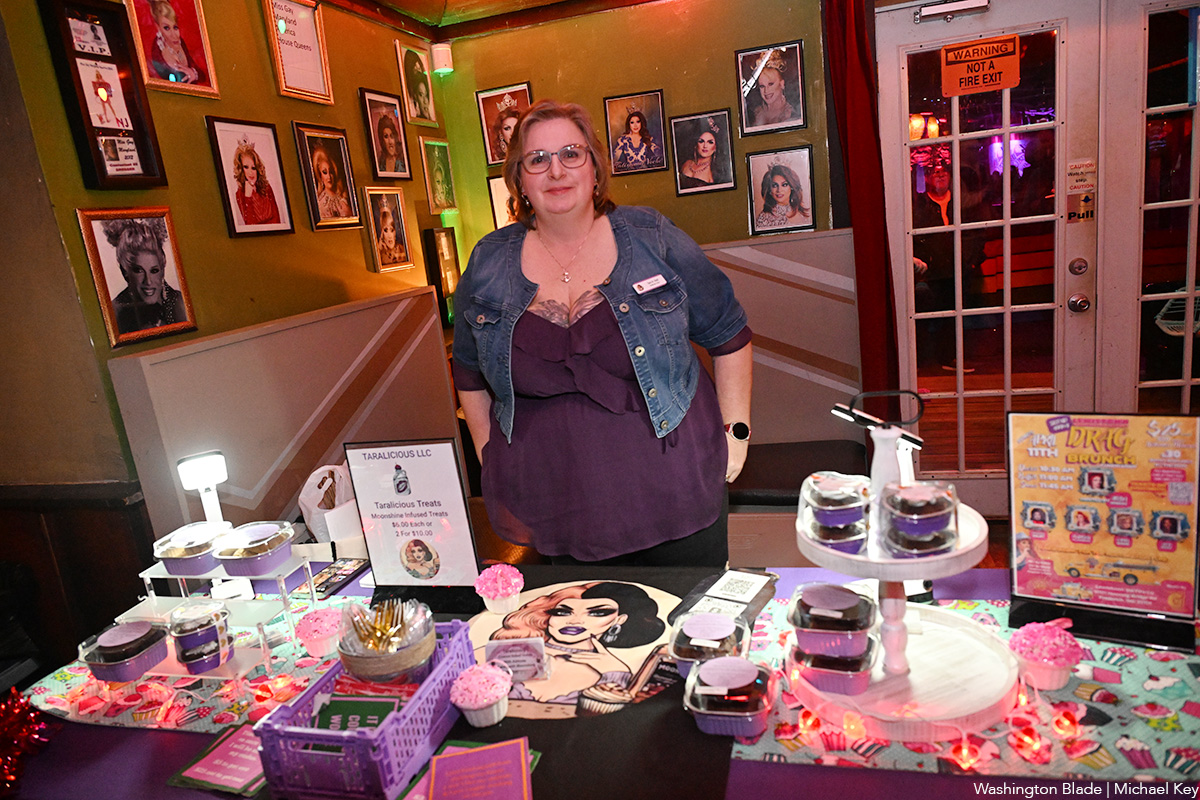
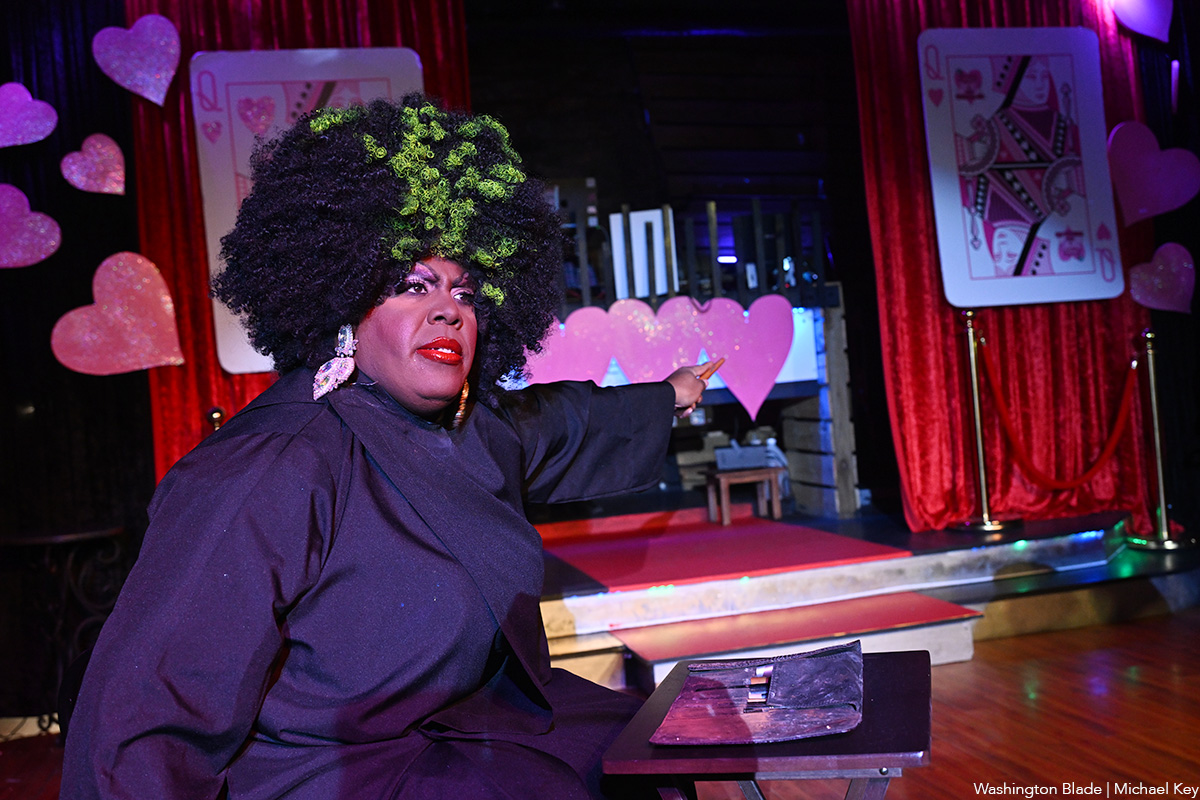
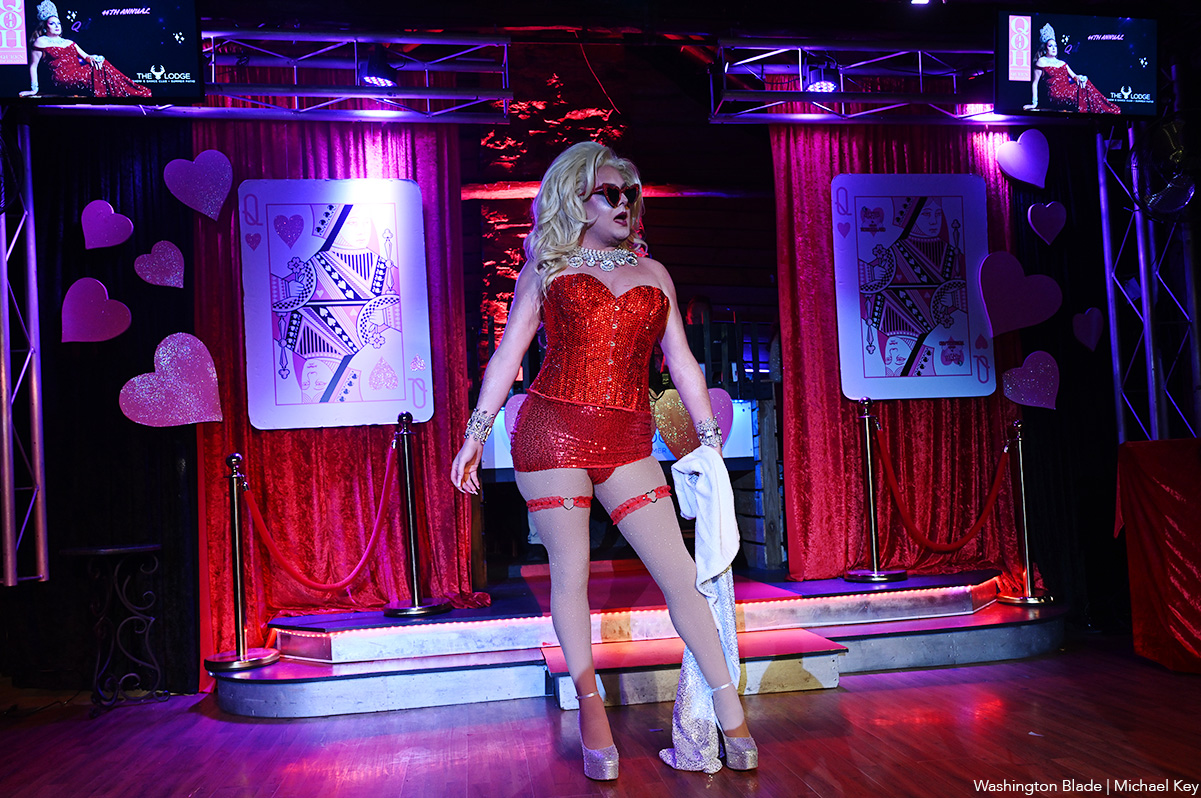
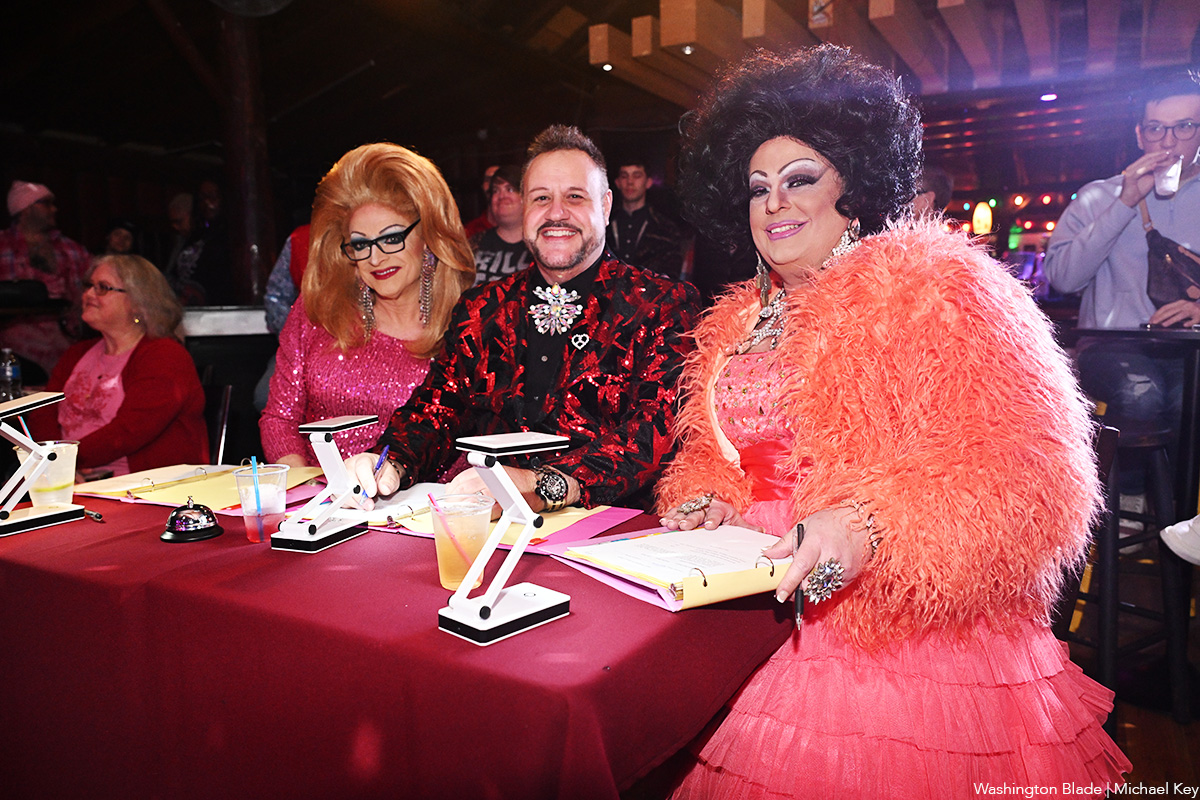
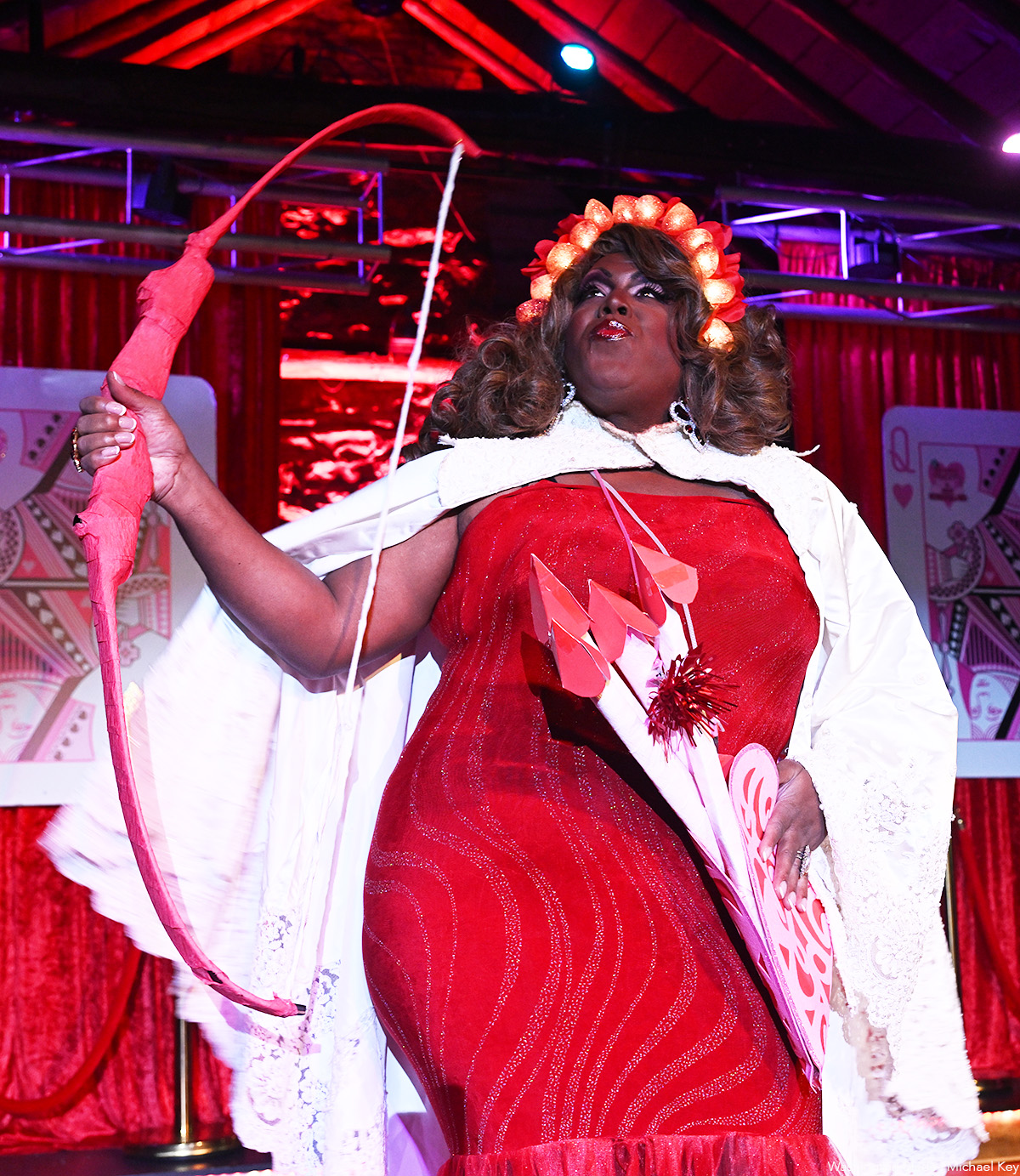
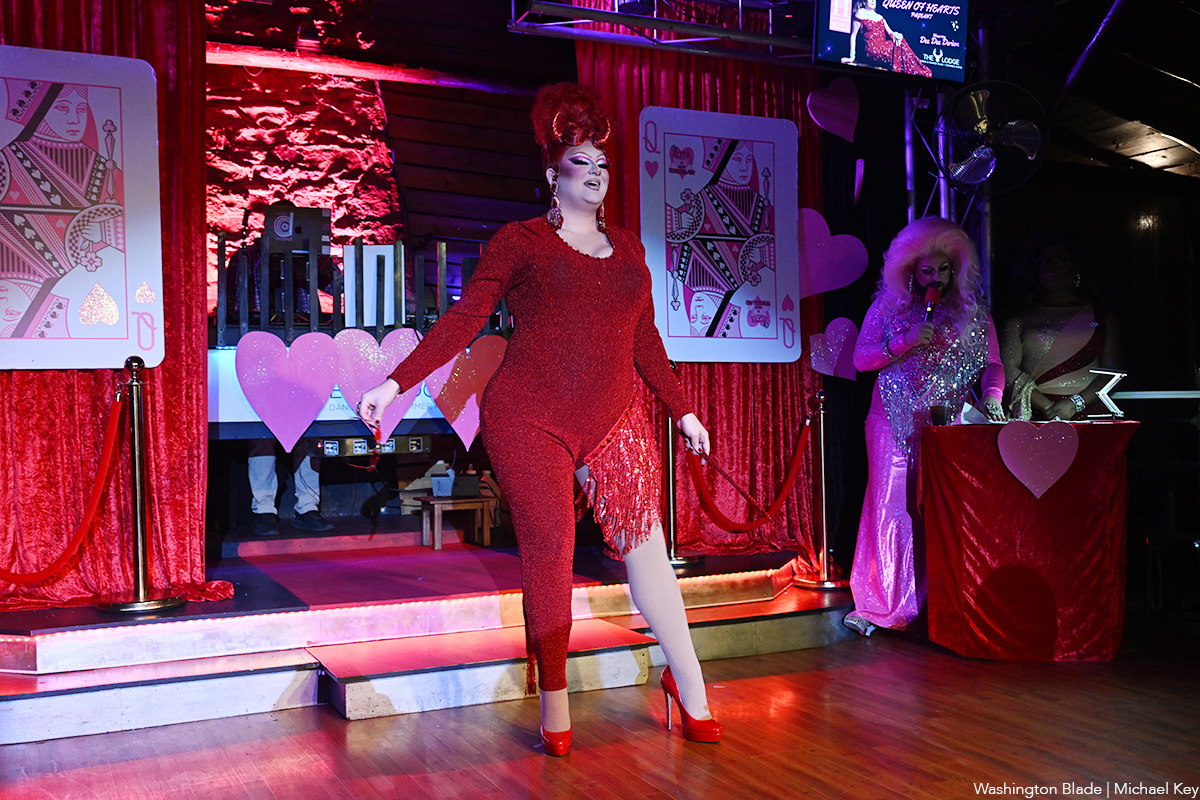
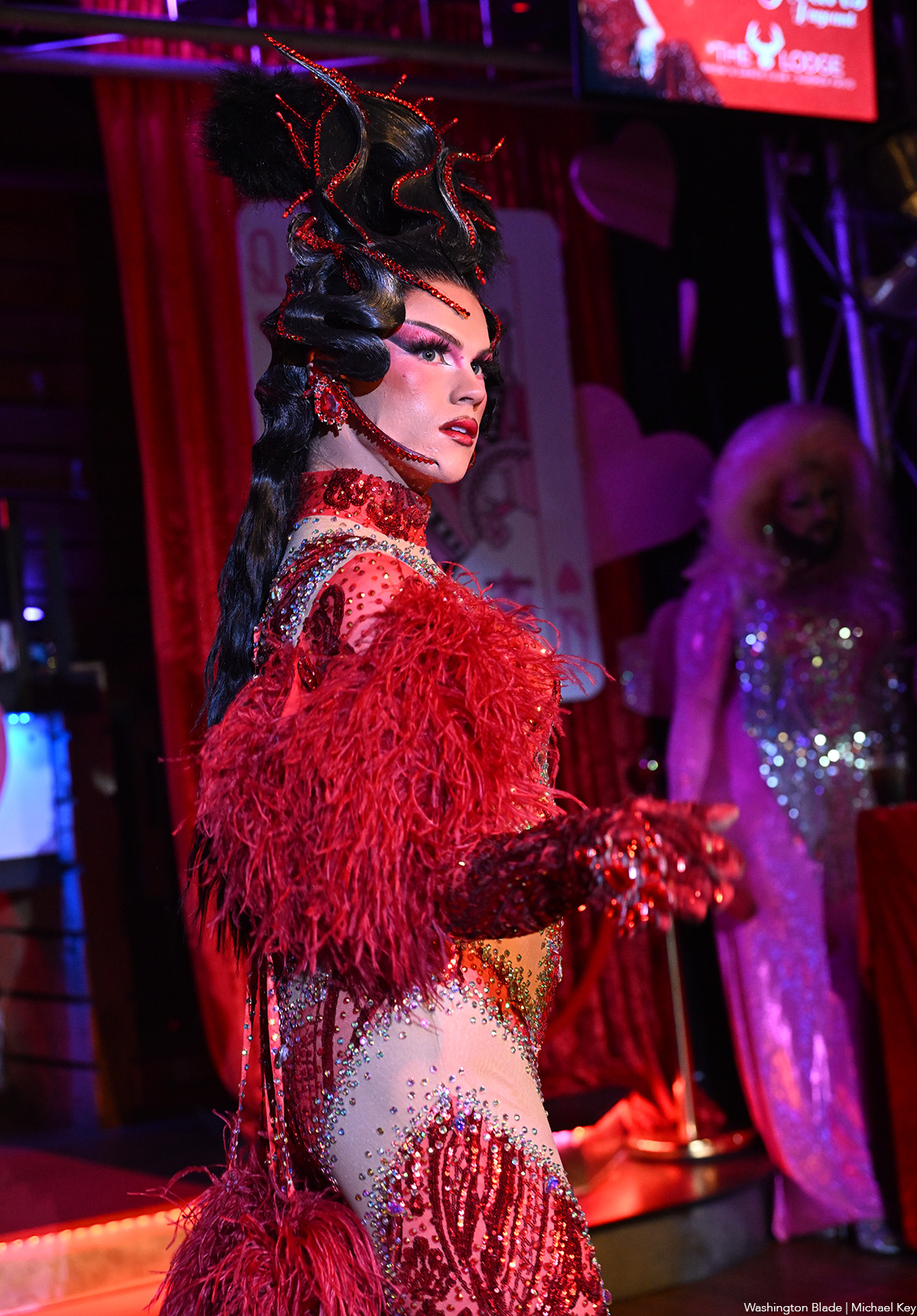
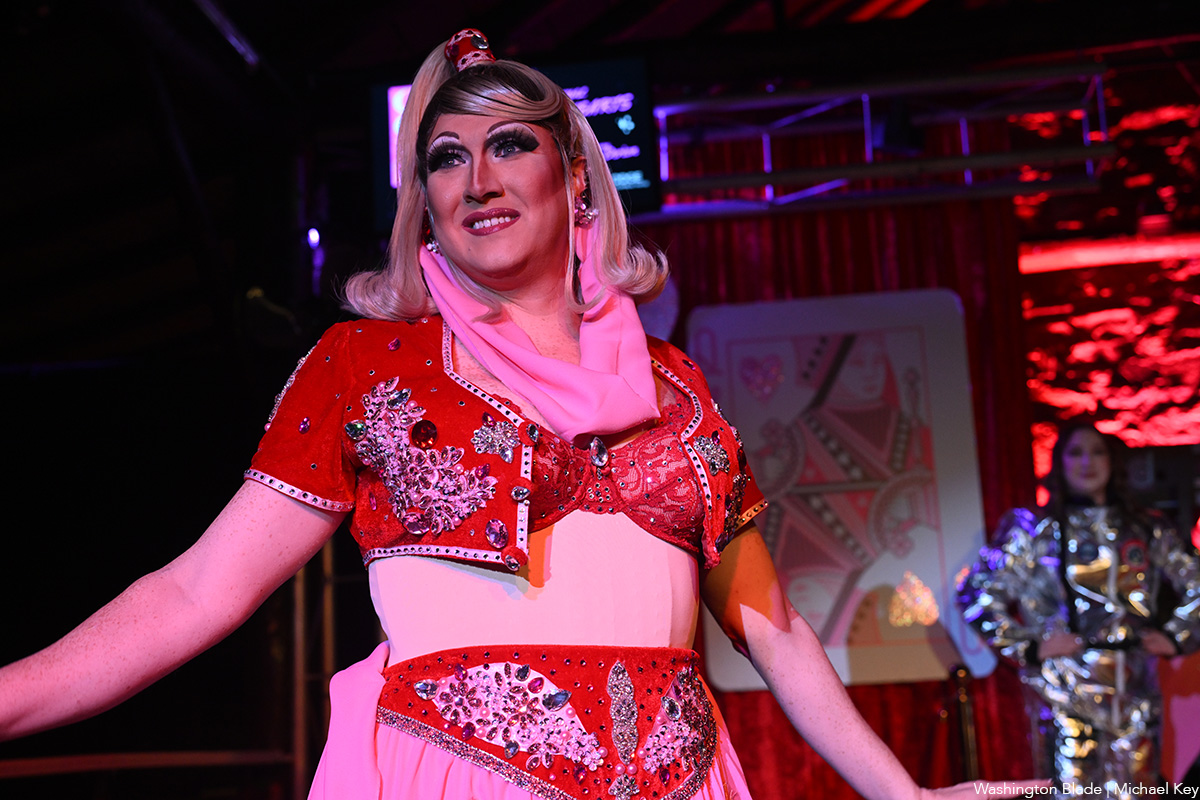
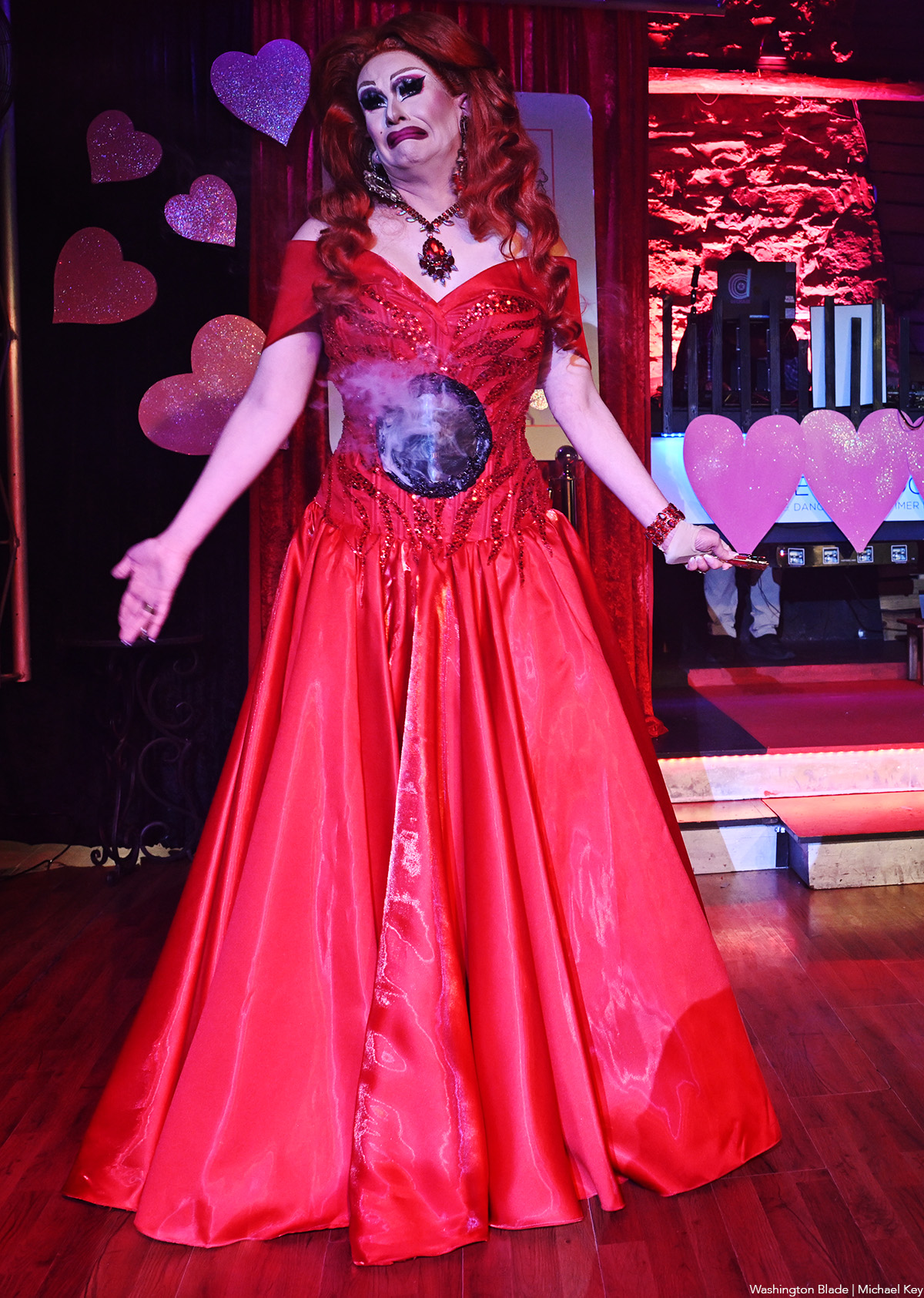
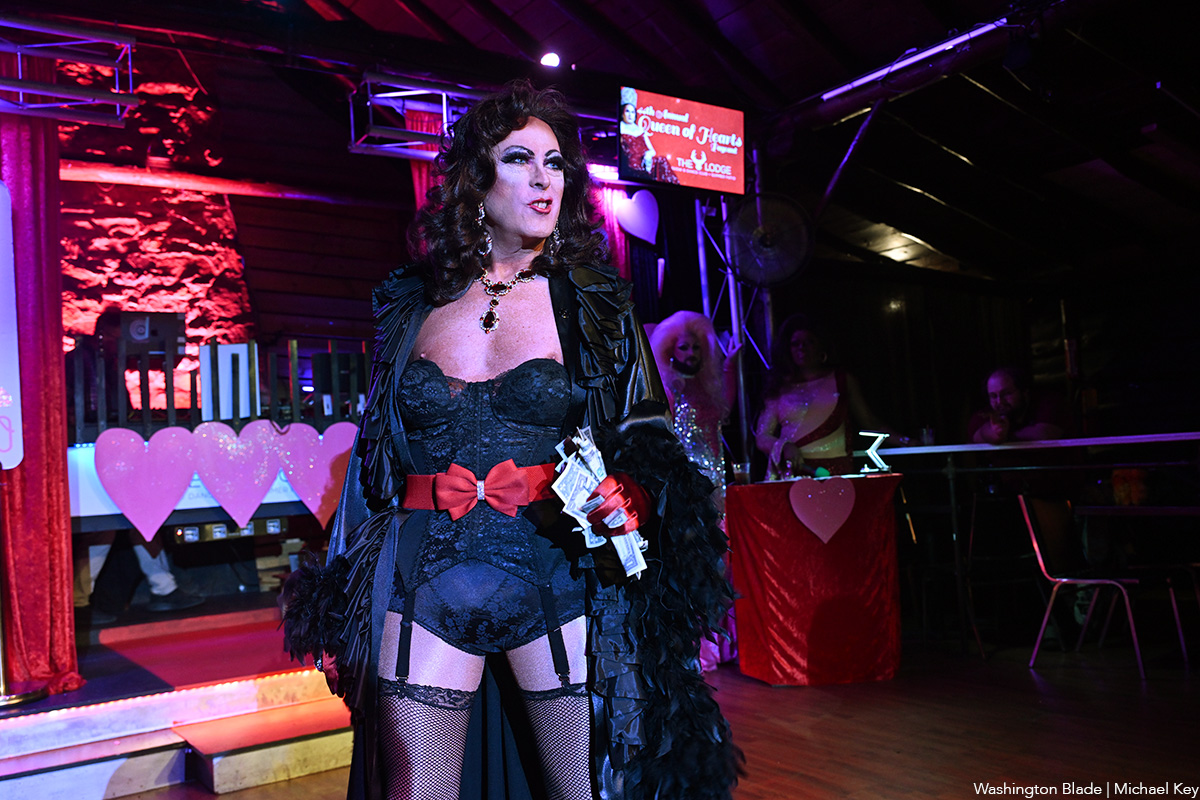
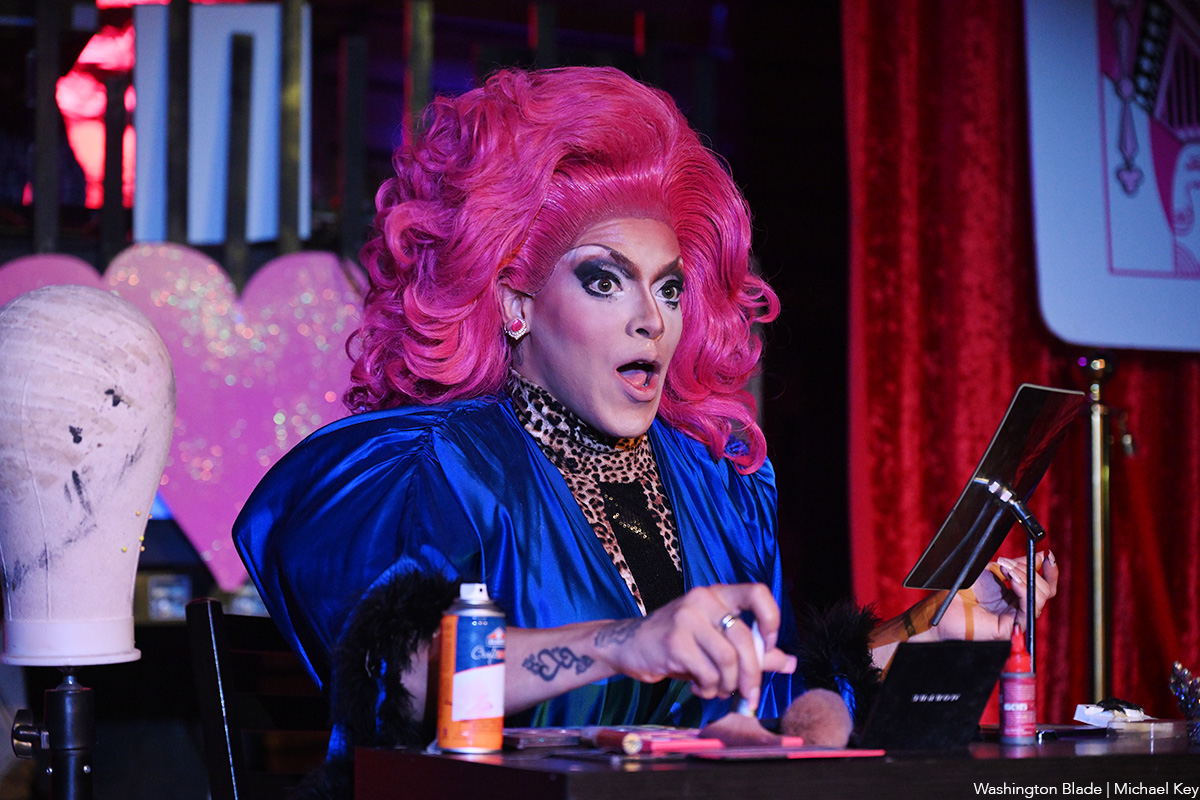
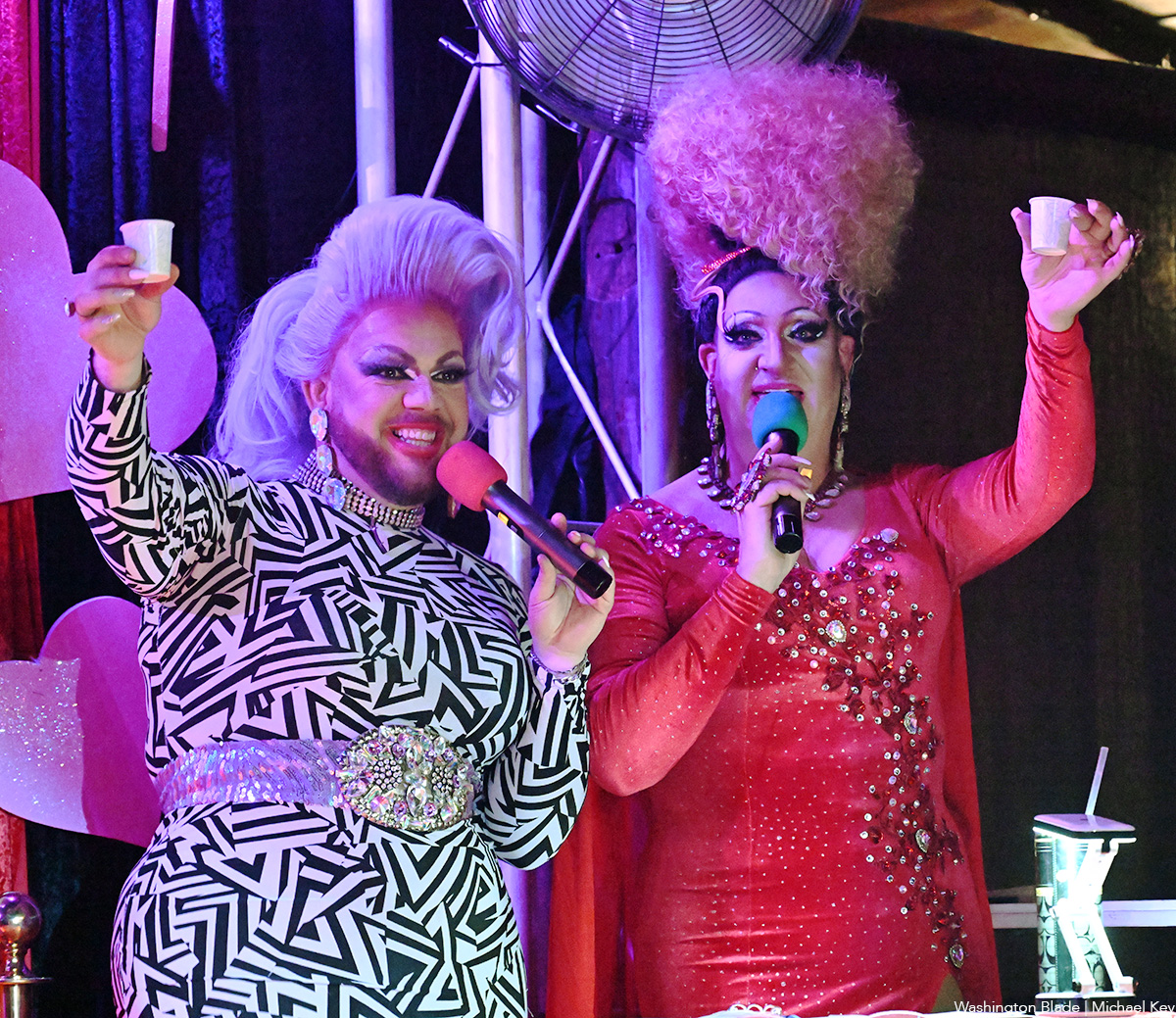
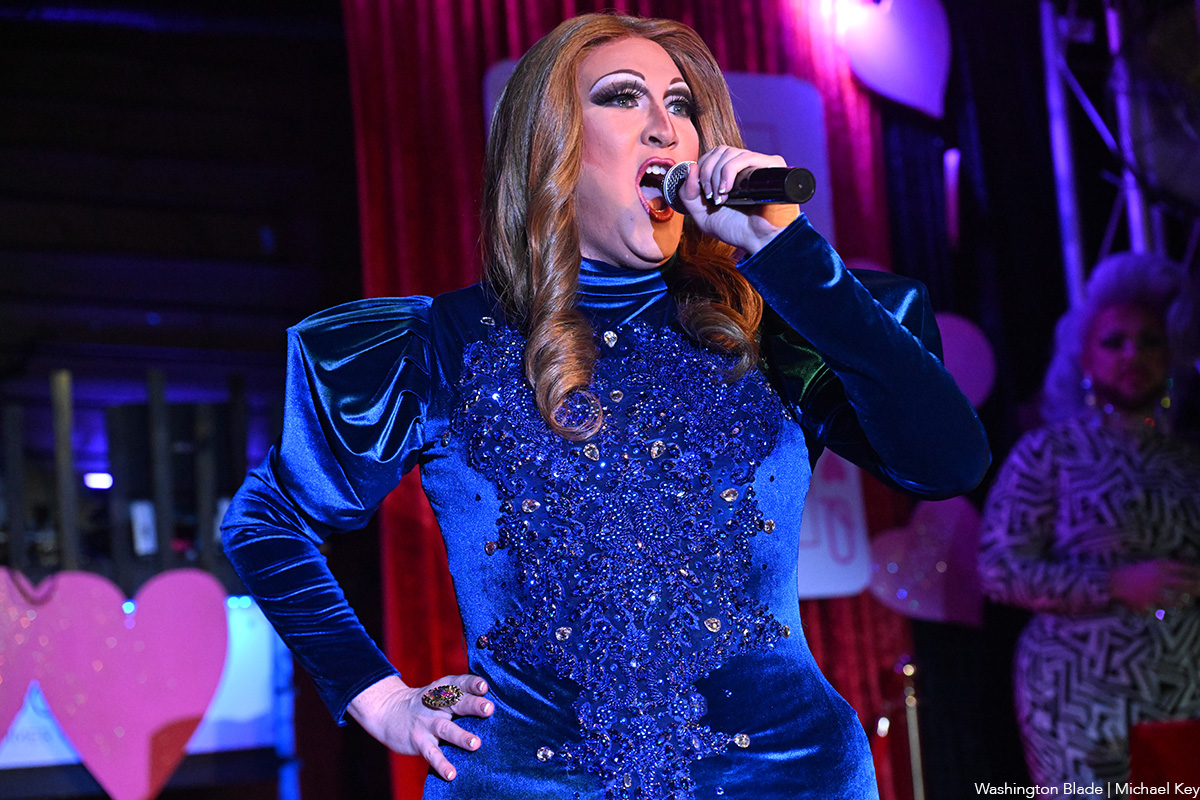
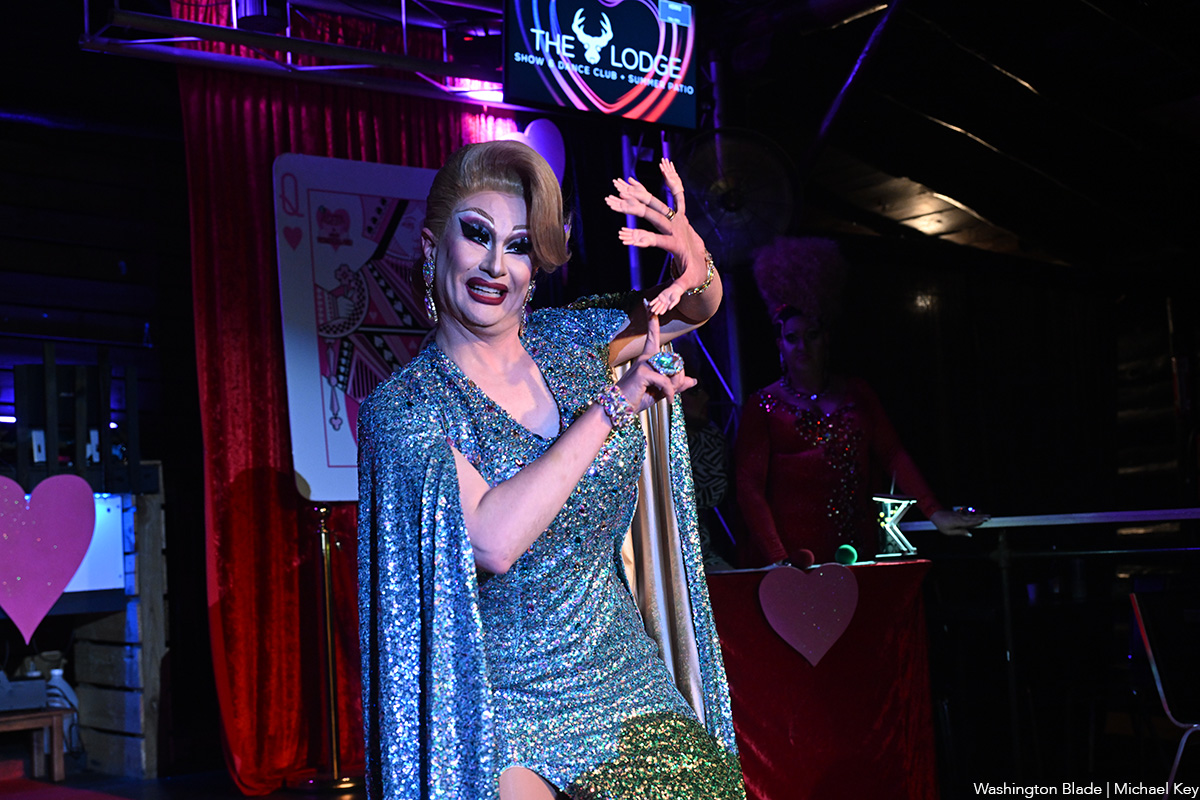
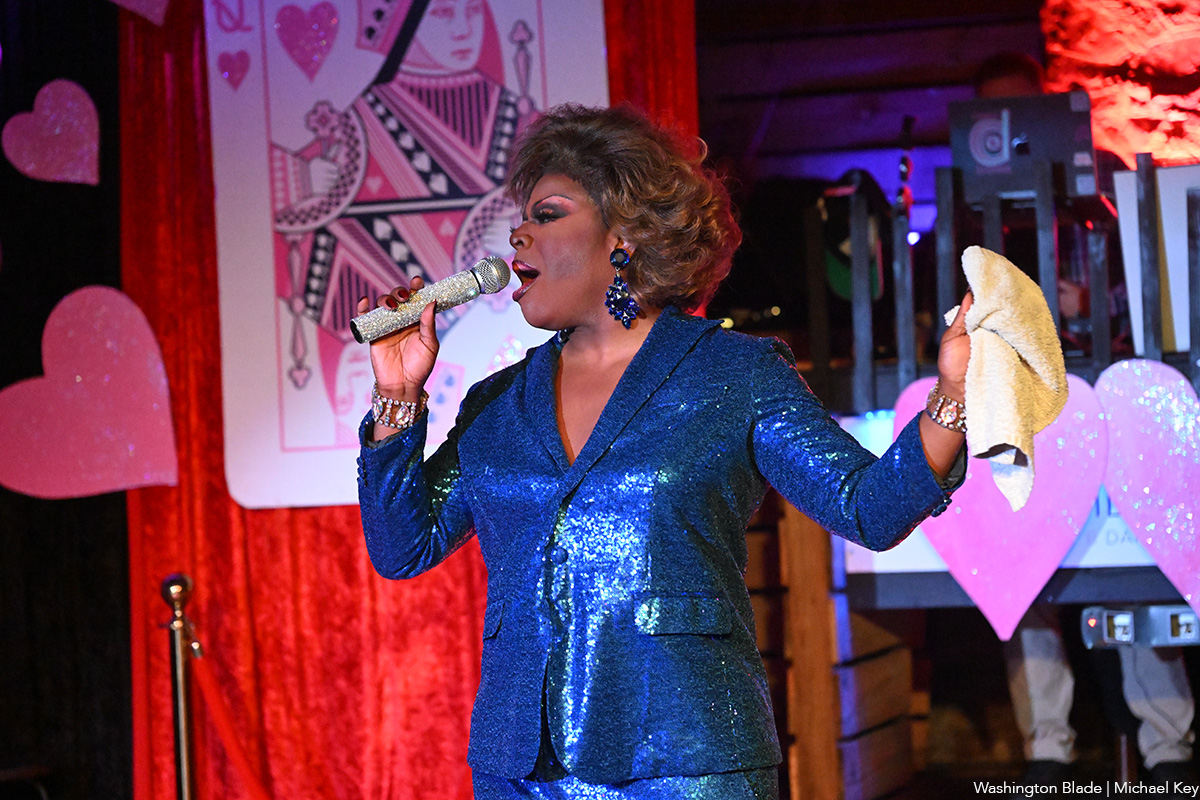
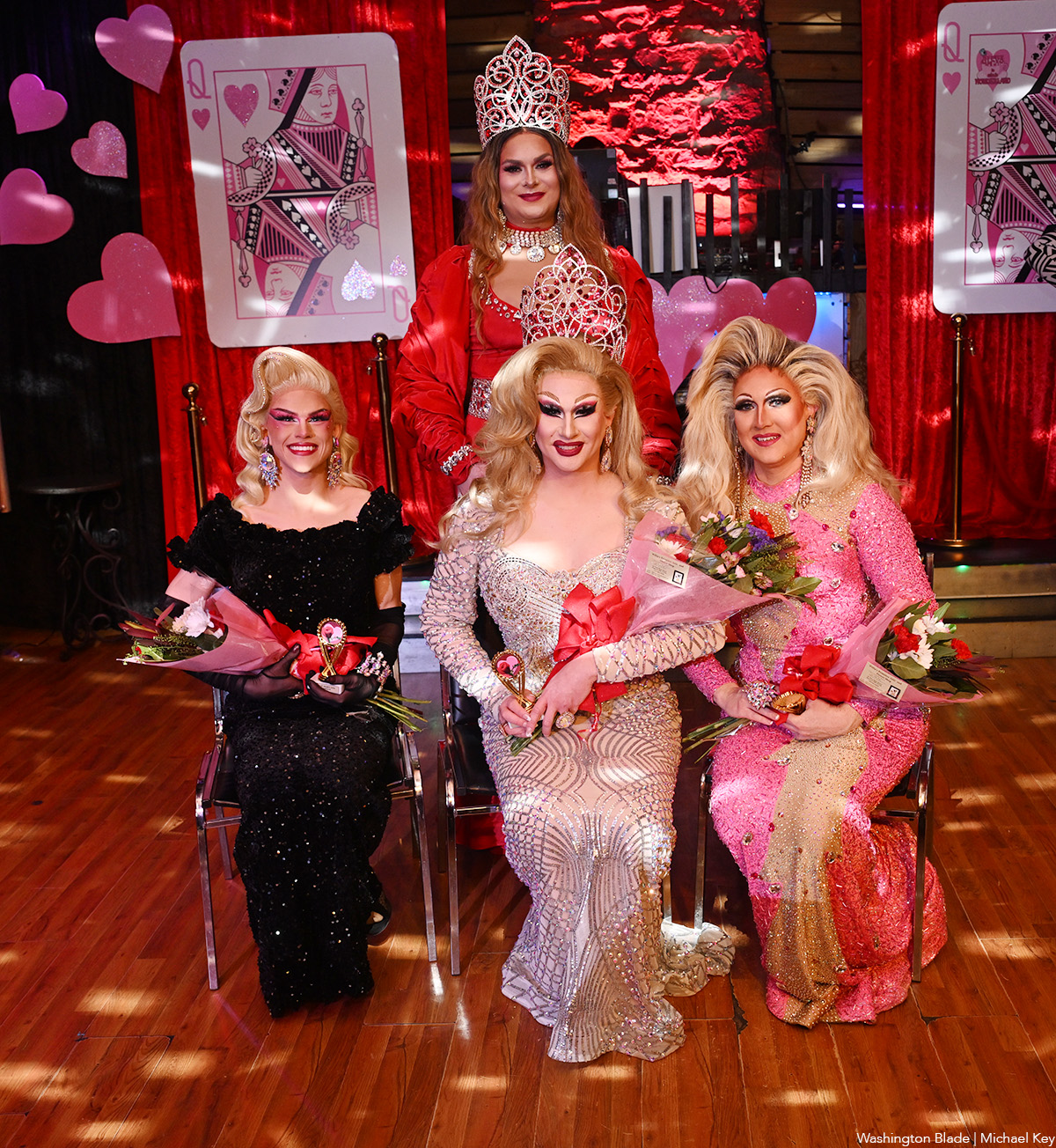
View on Threads
Books
New book profiles LGBTQ Ukrainians, documents war experiences
Tuesday marks four years since Russia attacked Ukraine

Journalist J. Lester Feder’s new book profiles LGBTQ Ukrainians and their experiences during Russia’s war against their country.
Feder for “The Queer Face of War: Portraits and Stories from Ukraine” interviewed and photographed LGBTQ Ukrainians in Kyiv, the country’s capital, and in other cities. They include Olena Hloba, the co-founder of Tergo, a support group for parents and friends of LGBTQ Ukrainians, who fled her home in the Kyiv suburb of Bucha shortly after Russia launched its war on Feb. 24, 2022.
Russian soldiers killed civilians as they withdrew from Bucha. Videos and photographs that emerged from the Kyiv suburb showed dead bodies with their hands tied behind their back and other signs of torture.

Olena Shevchenko, chair of Insight, a Ukrainian LGBTQ rights group, wrote the book’s forward.

The book also profiles Viktor Pylypenko, a gay man who the Ukrainian military assigned to the 72nd Mechanized Black Cossack Brigade after the war began. Feder writes Pylypenko’s unit “was deployed to some of the fiercest and most important battles of the war.”
“The brigade was pivotal to beating Russian forces back from Kyiv in their initial attempt to take the capital, helping them liberate territory near Kharkiv and defending the front lines in Donbas,” wrote Feder.
Pylypenko spent two years fighting “on Ukraine’s most dangerous battlefields, serving primarily as a medic.”
“At times he felt he was living in a horror movie, watching tank shells tear his fellow soldiers apart before his eyes,” wrote Feder. “He held many men as they took their final breaths. Of the roughly one hundred who entered the unit with him, only six remained when he was discharged in 2024. He didn’t leave by choice: he went home to take care of his father, who had suffered a stroke.”
Feder notes one of Pylypenko’s former commanders attacked him online when he came out. Pylypenko said another commander defended him.
Feder also profiled Diana and Oleksii Polukhin, two residents of Kherson, a port city in southern Ukraine that is near the mouth of the Dnieper River.
Ukrainian forces regained control of Kherson in November 2022, nine months after Russia occupied it.
Diana, a cigarette vender, and Polukhin told Feder that Russian forces demanded they disclose the names of other LGBTQ Ukrainians in Kherson. Russian forces also tortured Diana and Polukhin while in their custody.
Polukhim is the first LGBTQ victim of Russian persecution to report their case to Ukrainian prosecutors.

Feder, who is of Ukrainian descent, first visited Ukraine in 2013 when he wrote for BuzzFeed.
He was Outright International’s Senior Fellow for Emergency Research from 2021-2023. Feder last traveled to Ukraine in December 2024.
Feder spoke about his book at Politics and Prose at the Wharf in Southwest D.C. on Feb. 6. The Washington Blade spoke with Feder on Feb. 20.
Feder told the Blade he began to work on the book when he was at Outright International and working with humanitarian groups on how to better serve LGBTQ Ukrainians. Feder said military service requirements, a lack of access to hormone therapy and documents that accurately reflect a person’s gender identity and LGBTQ-friendly shelters are among the myriad challenges that LGBTQ Ukrainians have faced since the war began.
“All of these were components of a queer experience of war that was not well documented, and we had never seen in one place, especially with photos,” he told the Blade. “I felt really called to do that, not only because of what was happening in Ukraine, but also as a way to bring to the surface issues that we’d had seen in Iraq and Syria and Afghanistan.”

Feder also spoke with the Blade about the war’s geopolitical implications.
Russian President Vladimir Putin in 2013 signed a law that bans the “promotion of homosexuality” to minors.
The 2014 Winter Olympics took place in Sochi, a Russian resort city on the Black Sea. Russia annexed Crimea from Ukraine a few weeks after the games ended.
Russia’s anti-LGBTQ crackdown has continued over the last decade.
The Russian Supreme Court in 2023 ruled the “international LGBT movement” is an extremist organization and banned it. The Russian Justice Ministry last month designated ILGA World, a global LGBTQ and intersex rights group, as an “undesirable” organization.
Ukraine, meanwhile, has sought to align itself with Europe.
Ukrainian President Volodymyr Zelenskyy after a 2021 meeting with then-President Joe Biden at the White House said his country would continue to fight discrimination based on sexual orientation and gender identity. (Zelenskyy’s relationship with the U.S. has grown more tense since the Trump-Vance administration took office.) Zelenskyy in 2022 publicly backed civil partnerships for same-sex couples.
Then-Ukrainian Ambassador to the U.S. Oksana Markarova in 2023 applauded Kyiv Pride and other LGBTQ and intersex rights groups in her country when she spoke at a photo exhibit at Ukraine House in D.C. that highlighted LGBTQ and intersex soldiers. Then-Kyiv Pride Executive Director Lenny Emson, who Feder profiles in his book, was among those who attended the event.
“Thank you for everything you do in Kyiv, and thank you for everything that you do in order to fight the discrimination that still is somewhere in Ukraine,” said Markarova. “Not everything is perfect yet, but you know, I think we are moving in the right direction. And we together will not only fight the external enemy, but also will see equality.”
Feder in response to the Blade’s question about why he decided to write his book said he “didn’t feel” the “significance of Russia’s war against Ukraine” for LGBTQ people around the world “was fully understood.”
“This was an opportunity to tell that big story,” he said.
“The crackdown on LGBT rights inside Russia was essentially a laboratory for a strategy of attacking democratic values by attacking queer rights and it was one as Ukraine was getting closet to Europe back in 2013, 2014,” he added. “It was a strategy they were using as part of their foreign policy, and it was one they were using not only in Ukraine over the past decade, but around the world.”
Feder said Republicans are using “that same strategy to attack queer people, to attack democracy itself.”
“I felt like it was important that Americans understand that history,” he said.

More than a dozen LGBTQ athletes won medals at the Milan Cortina Winter Olympics that ended on Sunday.
Cayla Barnes, Hilary Knight, and Alex Carpenter are LGBTQ members of the U.S. women’s hockey team that won a gold medal after they defeated Canada in overtime. Knight the day before the Feb. 19 match proposed to her girlfriend, Brittany Bowe, an Olympic speed skater.
French ice dancer Guillaume Cizeron, who is gay, and his partner Laurence Fournier Beaudry won gold. American alpine skier Breezy Johnson, who is bisexual, won gold in the women’s downhill. Amber Glenn, who identifies as bisexual and pansexual, was part of the American figure skating team that won gold in the team event.
Swiss freestyle skier Mathilde Gremaud, who is in a relationship with Vali Höll, an Austrian mountain biker, won gold in women’s freeski slopestyle.
Bruce Mouat, who is the captain of the British curling team that won a silver medal, is gay. Six members of the Canadian women’s hockey team — Emily Clark, Erin Ambrose, Emerance Maschmeyer, Brianne Jenner, Laura Stacey, and Marie-Philip Poulin — that won silver are LGBTQ.
Swedish freestyle skier Sandra Naeslund, who is a lesbian, won a bronze medal in ski cross.
Belgian speed skater Tineke den Dulk, who is bisexual, was part of her country’s mixed 2000-meter relay that won bronze. Canadian ice dancer Paul Poirier, who is gay, and his partner, Piper Gilles, won bronze.
Laura Zimmermann, who is queer, is a member of the Swiss women’s hockey team that won bronze when they defeated Sweden.
Outsports.com notes all of the LGBTQ Olympians who competed at the games and who medaled.
-

 District of Columbia4 days ago
District of Columbia4 days agoJudge rescinds order against activist in Capital Pride lawsuit
-

 District of Columbia4 days ago
District of Columbia4 days agoTrans activists arrested outside HHS headquarters in D.C.
-

 Opinions4 days ago
Opinions4 days agoHow do we honor Renee Good, Alex Pretti?
-

 Sports5 days ago
Sports5 days agoUS wins Olympic gold medal in women’s hockey



